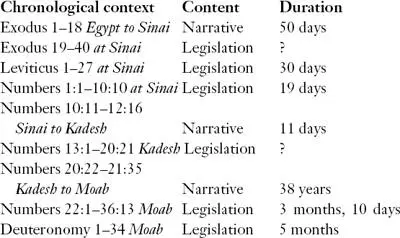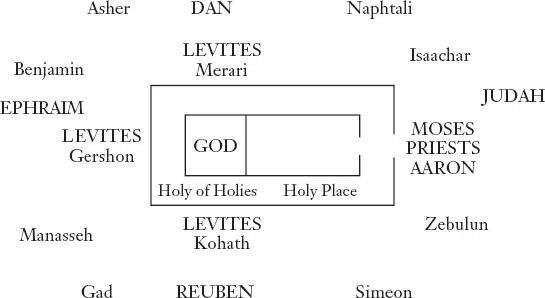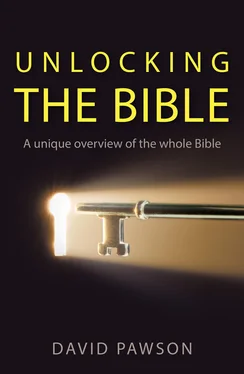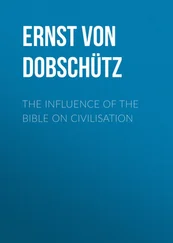Two-thirds of the book of Numbers is about this protracted journey. The Bible is a very honest book, telling us about failures and vices as well as great successes and virtues. When Paul told the Corinthians that Numbers was written down as an example and a warning to us, he meant this as a clear statement of the book’s purpose. It may not be a popular book, but if you do not study history you are condemned to repeat it.
Even Moses was not permitted to go into the Promised Land, although he did enter it centuries later when he talked with Jesus. He too failed miserably at one crucial point, as we shall see.
Content and structure
Another of the five books of Moses, Numbers is a mixture of legislation and narrative. The author of the laws is not Moses but God. We are told 80 times in this book, ‘God said to Moses…’ God gives to Moses general laws and legislation, as well as regulations governing rituals and religious ceremony.
As for the narrative in the book, we are told that Moses kept a journal of their travels at the Lord’s command. He also kept another book called ‘the book of the Wars of the LORD’, recording accounts of the battles. Numbers was written by Moses using these records, yet Moses himself is referred to in the third person
The mixture of narrative and legislation makes it seem rather like Exodus, but whereas in Exodus the first half is narrative and the second half law, in Numbers it is all mixed up. It is therefore much harder to find a connecting thread.
A pattern emerges more easily when we consider the narrative and legislation in context. The structure of the book is chronological rather than topical. We can see this best by putting the content of Numbers alongside that of Exodus, Leviticus and Deuteronomy.

It is fascinating to note that all the laws were given to the Israelites while they were camped. The stories of their travels show how they broke those laws. While they were camped and stationary God told them what they should do, but while they were moving we hear the story of what they did do. They would learn lessons both ways, through the teaching from Moses and through the experience of journeying (rather as Jesus taught his disciples both in ‘messages’, such as the Sermon on the Mount, and as they travelled ‘along the way’).
The chart given above is like a multi-layered sandwich. Thus in Exodus 1–11 the Israelites are stuck in Egypt, then in Chapters 12–18 they move to Sinai. All this is narrative. However, in Exodus 19–40, Leviticus 1–27 and Numbers 1–10 they are still at Sinai. These three consecutive sections are full of legislation.
In Numbers 10–12 they move again, from Sinai to Kadesh, a journey of 11 days. The stay in Kadesh covers the crisis when the people rebel. God speaks to them at Kadesh from Chapters 13 to 20, again with legislation.
Numbers 20–21 covers the journey from Kadesh to Moab, the whole journey of 38 years covering just two chapters. Numbers 22–36 covers what God said to the Israelites while they waited to go into the Promised Land. The whole of Deuteronomy 1–34 belongs to that same, stationary time period.
Numbers has a lot of movement in it, Deuteronomy has none, and Exodus has movement in just the first half.
Legislation
As noted above, we are told on 80 occasions in Numbers that God spoke to Moses ‘face to face’. This was unique: others would receive God’s Word through visions when they were awake or dreams when they were asleep. The people would consult the priests’ urim (the equivalent of ‘drawing lots’) when they wished to discern God’s mind on a situation.
Moses first met with God on Mount Sinai, some distance from the rest of Israel, but now that the tabernacle was constructed God was dwelling with the people. The big danger now that God was ‘with them’, however, was that they might become overfamiliar, lose their sense of awe and respect, and forget his holiness. The laws in Numbers are not moral or social laws, but laws given to prevent the people from losing their reverence for God. The laws can be classified under three headings: carefulness, cleanliness and costliness.
1. Carefulness
WHEN CAMPED
They had to be very careful to camp in the right place (Chapter 2). Each tribe was allotted a specific place in relation to the other tribes and the tabernacle in the centre. The camp looked like a ‘hollow rectangle’ from above (see the chart below). The only other nation known to camp in this manner were the Egyptians – this was the preferred arrangement of Rameses II (the Pharaoh who may have been on the throne at the time).
The tabernacle in the centre was surrounded by a fence and there was only one entrance. Two people camped outside the entrance – Moses and Aaron. The Levites camped around the other three sides, and three of their clans had special responsibility – Merari, Gershon and Kohath. No one else could even touch the fence and there were orders to kill anyone who approached. God was holy and could not be approached lightly.

The other tribes were arranged around the tabernacle, each tribe with its own specific, allotted place in relation to God’s tent and the entrance to it. The most important place was right in front of the entrance, and this was occupied by the tribe of Judah. It was from the tribe of Judah that Jesus would later come.
WHEN TREKKING
When the camp set out on a journey, everyone moved according to a fascinating pattern. There were specific instructions for the dismantling and transporting of the tabernacle. The priests would wrap up the holy furniture, then the Levites would pick it up. Everyone knew who had to carry which piece of furniture from the tabernacle, who had to carry the curtains, and what order they had to be carried in. Some tribes had to leave before the tabernacle pieces were carried. When the other tribes moved they ‘unpeeled’ like an orange. They marched in the same order every time, so that when they got to the next camp it was simple for each tribe to find their place and put their tents up. The whole thing is carefully detailed. The silver trumpets would sound to announce the departure from the camp, and the tribe of Judah would lead the procession with praise
They always knew when it was time to move because the pillar of cloud (or fire at night) above the tabernacle would move on. The picture is clear: when God moves, his people move.
Why is God so fussy about all these details? Not only was it a very efficient way to move such a vast quantity of people, but it was also a very efficient way of camping. He was saying, ‘Be careful!’ A careless attitude does not have a place in God’s camp: carelessness is a dangerous thing. A modern word for this would be ‘casualness’, the ‘any old thing will do for God’ attitude.
In these detailed directions God is telling his people to be careful, for he is in the camp with them. He also outlines other areas where they would need to be careful. There are some sins mentioned in Numbers which are sins of ‘carelessness’. Carelessness on the Sabbath was punishable by death. They were to have tassels on their clothes to remind them to pray. Vows had to be taken very seriously. If a vow was made to God it must be kept. (In Judges we have the story of a man who vowed to sacrifice to God the first living thing that he met when he came out, and he met his daughter!) If a wife makes a vow to God, then her husband has 24 hours to agree or disagree with it.
Читать дальше













